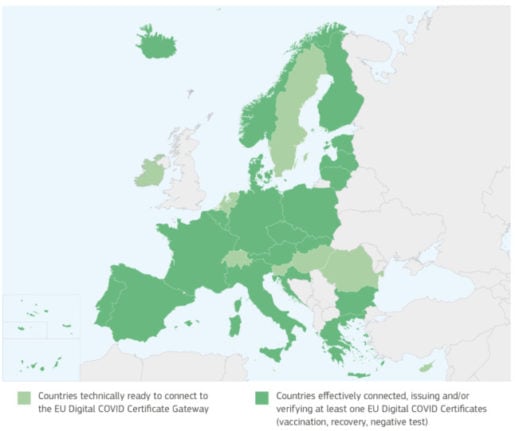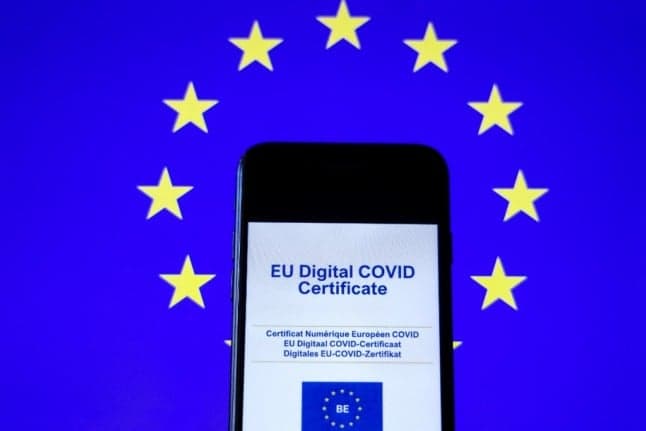What is the EU Covid certificate?
According to the EU the digital Covid certificate "will facilitate safe free movement of citizens in the EU during the COVID-19 pandemic." Essentially that means no quarantine measures or need to supply negative Covid tests before or after travel.
The idea is that the document – which can be on paper or stored electronically on smartphones – will carry proof via a QR code that the holder has either:
- been vaccinated against Covid-19
- recently recovered from the virus (meaning the holder has antibodies in their system)
- recently tested negative for Covid
This proof can be shown to whoever requires it, whether border police or airline, rail officials. EEA countries (Iceland, Norway and Liechtenstein) plus Switzerland will be part of the scheme.
The certificates will be free and come in both English and the national language where they are distributed.
It's worth noting that the Covid certificates are not compulsory for travel within the EU, but those who travel without it will likely be subject to whatever requirements are in place around testing and quarantine.
When will it come into use?
Some countries across the EU have already been using the certificate although there has been doubts and confusion over whether border police in these countries actually recognise it.
But from Thursday July 1st it will be rolled out across the EU and Schengen area and possibly after that non-EU / Schengen countries like the UK and the US will become part of the scheme to allow for smooth travel between those countries and member states (more on this below).
So it will mean the entry rules are the same for all countries within the EU/ EEA /Schengen area?
No, that would be way too simple. (To check which rules countries have in place for the EU Covid certificate click HERE)
What the pass does is provide a single certificate or code that can be read anywhere within the EU/Schengen zone and tells border police or transport company employees your vaccine status or most recent test result.
However, it is up to individual countries to set their rules of entry and there are some differences throughout the Bloc.
For example, some countries count you as "fully vaccinated" only two weeks after your second dose, others will accept vaccine proof from a first dose.
When it comes to testing only some countries accept self-tests, while there are differences in how recently you need to have taken a test - 72 hours or 48 hours.
So you still need to look up the rules of the country you are travelling to, and check that your test/vaccine status complies.
How can EU residents get the certificate?
Member states are in charge of issuing the certificates so getting hold of one is a slightly different process in each country.
Access to the pass depends on where you were vaccinated, not what passport you hold, so if you live in an EU country and were vaccinated there, you should be able to access the pass using the certificate issued by your country of residence.
Most countries have developed smartphone apps to store the certificates, but the EU has also helped countries develop other software where the vaccine certificates can be stored.
Whilst the full EU Covid certificates are meant to prove negative tests and recovery in most countries they are so far only set up so far to prove vaccination. As of July 1st only negative test results with QR codes will be accepted for travel.
These vaccination certificates are obtained in different ways depending on the member state, but most are handed out after vaccination or online via an e-health portal. But beware those certificates given after inoculation might not be suitable for travel.
In some countries like France, people are given a vaccination certificate with a QR code after inoculation. But these certificates need to be converted into an EU Covid certificate, complete with a different QR code, via the online e-health portal. The new QR code can then be scanned and uploaded onto the French Covid app.
It takes only a minute but needs to be done prior to travel.
Here's more information on how to get the certificate in these countries: France, Italy, Germany, Spain, Switzerland, Norway, Denmark, Sweden, Austria.

How does it actually work?
Let's let the EU explain: "The EU Digital COVID Certificate contains a QR code with a digital signature to protect it against falsification. When the certificate is checked, the QR code is scanned and the signature verified.
"Each issuing body (e.g. a hospital, a test centre, a health authority) has its own digital signature key. All of these are stored in a secure database in each country."
The basic information the QR code will contain once it's fully up and running is as follows.
- For a vaccination certificate: vaccine type and manufacturer, number of doses received, date of vaccination;
- For a test certificate: type of test, date and time of test, place and result;
- For a recovery certificate: date of positive test result, validity period.
How did the EU set this up?
The European Commission built a "gateway" through which all certificate signatures can be verified by border officials across the bloc.
While the EU did not create its own app or software to store the certificates, as many had expected, the European Commission did help member states develop national software and apps "to issue, store and verify certificates and supported them in the necessary tests to on-board the gateway."
So what will this mean for travel in reality?
The EU’s hope is that the certificates will help smooth travel around the Bloc. France's briefing document on this is headed 'this summer, only the virus will not be able to travel freely'.
The EU states: "When travelling, the EU Digital Covid Certificate holder should in principle be exempted from free movement restrictions: Member States should refrain from imposing additional travel restrictions on the holders of an EU Digital COVID Certificate, unless they are necessary and proportionate to safeguard public health."
This is easier said than done and since the beginning of the pandemic EU member states have shown they will go their own way when it comes to introducing border restrictions or indeed relaxing them. Finding common ground has been difficult throughout the pandemic.
We just have to look at the current split between Germany and tourist-reliant countries such as Greece and Spain. While Germany's Chancellor Angela Merkel wants all EU member states to impose quarantine measures on arrivals from the UK, countries such as Greece and Spain have so far resisted.
Germany's concern is caused by the threat of the Delta variant in the UK, which has caused new infection rates to spiral - although hospital and death rates remain low.
The EU acknowledges that the threat of the Delta variant or indeed any other variant that may emerge could scupper the Covid certificate scheme. It accepts that in such a case freedom of movement may come to an abrupt end once again.
"In such a case – for instance as a reaction to new variants of concern – that Member State would have to notify the Commission and all other Member States and justify this decision.
So what about non-EU/ Schengen countries?
There has been talk since the scheme was announced that there would be agreements struck between the US and the EU to allow for similar frictionless travel for arrivals.
The EU recently added the US to its white list for travel, essentially paving the way for the return of tourists. But the list is only a recommendation with countries deciding at a national level what their entry policy is when it comes to borders.
Countries like France have already taken a lead and opened up their borders to travellers from the US and Canada by adding the countries to its own green list.
Italy is also allowing arrivals from the US, Canada and Japan under the terms of its version of the ‘green pass’ scheme.
If the US and the EU reach an agreement to extend the Covid certificate scheme it is still not clear how it would work in practice for travellers from the United States, who mostly don’t have vaccine certificates with QR codes on them.
And the UK?
Things are more complicated here due to the spread of the more contagious Delta variant in the UK. As mentioned above there is a split between member states about what to do with the UK, which still requires arrivals from EU countries to quarantine for 10 days and take PCR tests after arriving in the country.
However the latest reports suggest that talks between Brussels and London are progressing in the right direction and that travel between members states and the UK could become possible but only for fully vaccinated travellers.
The idea is that the UK's NHS app which contains vaccination certificates will be compliant with the EU's own "gateway" to allow for mutual recognition of inoculations.
A spokesman for the French health ministry said on Thursday that because the UK's vaccination certificates comply with World Health Organisation format they "will eventually be compatible".

Join the conversation in our comments section below. Share your own views and experience and if you have a question or suggestion for our journalists then email us at [email protected].
Please keep comments civil, constructive and on topic – and make sure to read our terms of use before getting involved.
Please log in here to leave a comment.